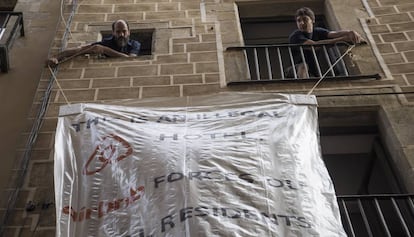In wake of fraud claims, Airbnb pulls 1,000 listings from Barcelona
Move affects Ciutat Vella and comes five months after website announced one-host, one-home policy

Airbnb, the short-term home rental site, on Tuesday announced that it has taken down 1,000 listings in Barcelona’s downtown district of Ciutat Vella over the last week. The move comes just days after news emerged about cases of fraud involving homes listed on the popular vacation rental website.

It is also a follow-up to a pledge made by company officials in February, when they said they would introduce a one-host, one-home policy in a part of the city that is under increasing pressure from high levels of tourism. The gesture, meant to reduce the supply of short-term rentals in the area, was also viewed as an olive branch for Barcelona city authorities, who have been critical of Airbnb’s practices.
Back then, Mayor Ada Colau dismissed the gesture as “a joke” and said that what the city wants is for Airbnb to pull all the illegal listings from its site. Local authorities note that tourist apartments require a special license to operate as such, known as HUT under its Catalan acronym.
By choosing to promote a campaign of fear and confusion over workable solutions, it’s local families who stand to lose most
Airbnb open letter
Now, Airbnb has released an open letter to Barcelona City Hall entitled: “Here’s why City Hall is wrong to turn its back on local families who share their homes.”
“Airbnb wants to be regulated in Barcelona, and we have zero tolerance for bad actors,” states the message. “We want to work with City Hall to clamp down on business operators who break the rules, while protecting local families who share their homes to boost their income and support their families.”
The letter is signed by Sergio Vinay, of the company’s public policy department, which is in charge of negotiating with local and regional authorities.

“In Barcelona, this guiding principle hits a roadblock. Unlike other major cities across the world, Barcelona has no rules for local families who occasionally share their homes,” the letter goes on to say. These rules are currently being worked out at the regional level.
“In the absence of such a collaboration, Airbnb has already taken steps to tackle issues facing Barcelona,” says Vinay in the letter. “In the last week alone, Airbnb has removed more than 1,000 listings that could affect long-term housing availability, as part of our ‘One Host, One Home’ policy. For context, that’s almost double the number of tourist dwellings that have ceased to operate following City Hall action.”
Vinay also takes issue with City Hall urban planning official Janet Sanz, who has been critical of Airbnb: “Janet Sanz is wrong to say that City Hall ‘is not fighting home sharing’ or local families who share their homes. It is – and by choosing to promote a campaign of fear and confusion over workable solutions, it’s local families who stand to lose most.”
Airbnb says that the average host in Barcelona makes an extra income of €5,500 a year
The San Francisco-based firm claims that the average Airbnb host in Barcelona is a homeowner who makes an extra income of €5,500 a year on average for “sharing their home” around 70 nights a year. “More than two-thirds of hosts say they share their primary residence and almost a quarter say that sharing their home has helped them avoid eviction or foreclosure.”
Last month, it emerged that a Barcelona woman had rented out her apartment to a long-term tenant, who then illegally listed it on Airbnb and began subletting it. Unable to reach her tenant, the woman was forced to rent out her own place through Airbnb, at which time she changed the lock and reported the case to the authorities.
English version by Susana Urra.
Tu suscripción se está usando en otro dispositivo
¿Quieres añadir otro usuario a tu suscripción?
Si continúas leyendo en este dispositivo, no se podrá leer en el otro.
FlechaTu suscripción se está usando en otro dispositivo y solo puedes acceder a EL PAÍS desde un dispositivo a la vez.
Si quieres compartir tu cuenta, cambia tu suscripción a la modalidad Premium, así podrás añadir otro usuario. Cada uno accederá con su propia cuenta de email, lo que os permitirá personalizar vuestra experiencia en EL PAÍS.
¿Tienes una suscripción de empresa? Accede aquí para contratar más cuentas.
En el caso de no saber quién está usando tu cuenta, te recomendamos cambiar tu contraseña aquí.
Si decides continuar compartiendo tu cuenta, este mensaje se mostrará en tu dispositivo y en el de la otra persona que está usando tu cuenta de forma indefinida, afectando a tu experiencia de lectura. Puedes consultar aquí los términos y condiciones de la suscripción digital.








































